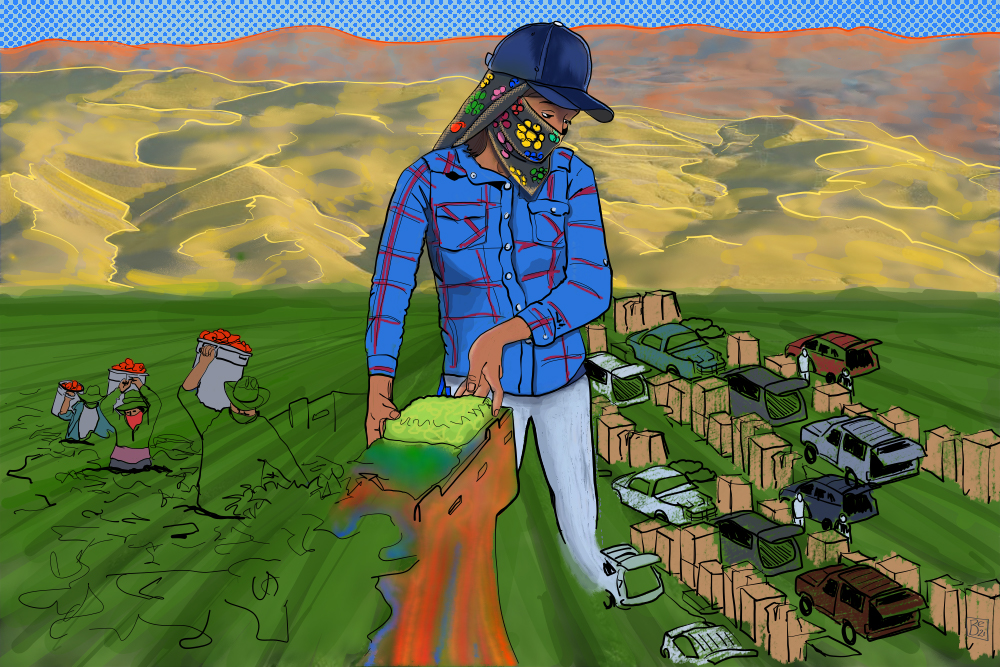
Illustration by Be Boggs.
Before COVID-19, our little food bank here in Kings County served 1,000 families, on average, a month. But in the pandemic, we are now working to feed more than five times that number, providing food for an estimated 5,000 families in our part of the San Joaquin Valley.
Rural food banks, like the one I work at, have an outsized importance, because there are fewer food options in smaller places. And while we are far from big cities like Los Angeles, where I lived until moving up here 12 years ago, we are in the middle of the pandemic’s challenges around poverty and health. So many people here in Kings County are in need of food in these times—including, ironically, farmworkers and others whose jobs involve food.
Our food bank is tiny—with just 2.5 employees (including myself). With a yearly budget that hovers around $150,000 for food, we are dependent on community support, donations, and volunteers to do three to four distributions a week. The pandemic has brought us more resources and more food—but also so many more people to feed.
Our food bank is just one small piece of Kings Community Action Organization, the non-profit organization that is also the federally designated anti-poverty agency for Kings County (population 152,000). KCAO’s main office is in Hanford, the county seat, but the food bank operations are in Lemoore.
Before COVID, most people would just walk up to our partner sites throughout the county, but now everything we do is drive-through. We’ve added more hours to our distribution, given out food at later hours, and also added some distribution on Saturdays.
As the pandemic deepens, our volunteers have noticed more families showing, many of them in nicer trucks and SUVS than we’re used to seeing. More people tell us that they had never expected to need the food bank, until they do. We’re seeing more emotion, as people cry in gratitude.
We’ve watched the need grow quickly among farmworkers, in particular, so much so that we have begun doing special food distributions just for them, where they live. One distribution even took us out to the fields—providing food where the food is literally grown. We bring much more than food when we do a distribution—we’re delivering PPE, hand sanitizer, and, more recently, some holiday tchotchkes and information about COVID vaccines.
I’ve been working at this food bank for the last four years, and fundraising is a constant part of the job. I have noticed that the past year has been good for grant writing, with new funding from the United Way, Bank of America, Southern California Edison, and from local community members. But most of the time, money is harder for rural banks; we don’t get the financial support that food banks in big cities like San Francisco and Los Angeles get from big companies, because there aren’t big companies here to sponsor you or your fundraising event. In more rural parts of the state, the bigger regional food banks receive more donations.
Our food bank, like many rural food banks, relies heavily on food provided through a federal program known as TEFAP (The Emergency Food Assistance Program) that supplements the diets of Americans with lower incomes through low-cost food. USDA provides food and administrative funds to states to operate the program and make deliveries to food banks like ours. We’re always careful to keep an inventory of two or three months of food, just in case there’s ever an interruption in the supply.
The demand in the pandemic has been intense—for every kind of food. We just had two distributions in one day—the first in Stratford and the other in Kettleman City where we provided not just food but water, because those communities have issues with water quality. We were averaging 55 families in those communities previously, but we had 200 families for these distributions.
With so much closed during COVID, we have a little more work to do in terms of finding locations for distribution that are actually open, but churches and community centers generously offer their space and parking lots. As the pandemic continues, we’ve also found that many people who used to deliver food to their own relatives no longer can, because someone has COVID or is isolating at home, Fortunately, Kings Cares Essential Workforce Support Program assists currently COVID-positive families. (There is comprehensive support to help essential workers isolate or quarantine safely, at home or in a hotel; healthy food, cleaning supplies, toiletries, transportation and laundry service, and utilities/housing assistance are all available.)
While this time is challenging, I worry it may be even harder for rural food banks when the pandemic is over. While the need for food could remain extra high, I fear that food donations and financial support may not be enough to keep up.
So don’t forget about us.
You can help us even if you don’t live nearby—by calling your legislative office to remind them how important food banks are in places where there are fewer food options. We also welcome donations from anywhere. And if you’re up for a trip, let us know. We can always use volunteers.




Send A Letter To the Editors